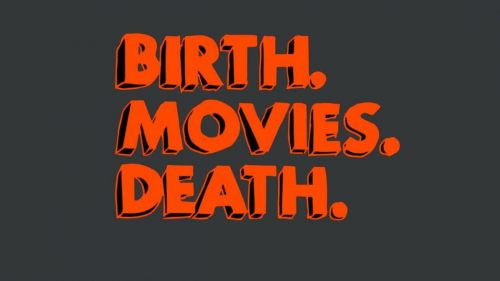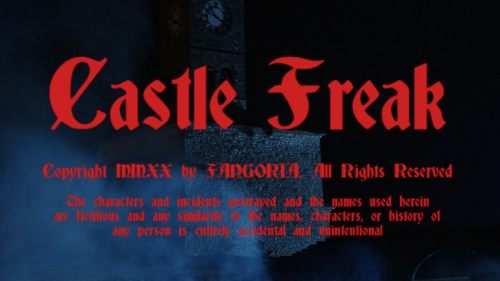Sunday Reads: Gore Maestro Tate Steinsiek Talks Modern Splatter & PUPPET MASTER
The first time I met Tate Steinsiek, he was blowing up a dude's head.
A large lumberjack of a man wearing a Fangoria t-shirt, surgical gloves, and sporting a disarming smile, Steinsiek was putting the finishing touches on a killer gore gag for the upcoming horror anthology, Scare Package (still in production). His workshop for the day - located in a vacant office in the abandoned Austin hospital in which Aaron Koontz's segment (titled Horror Hypothesis) is shooting - is covered in crimson, with another hollowed out dome sitting on a table within arm's reach. He's a guy whose business is carnage, and right now business is booming.
Not only did Tate just wrap shooting on that segment - which will enter post production soon and now possibly owns the record for most gallons of blood used per minute in a film (they're still crunching the numbers behind the scenes) - he's also got new gore classic Puppet Master: The Littlest Reich hitting theaters and VOD this weekend. In addition, Steinsiek will be helming the Castle Freak redux next, which will be produced by Full Moon honcho Charles Band and Cinestate (Brawl In Cell Block 99), along with showcasing original star Barbara Crampton (who also owns a meaty role in The Littlest Reich).
A few days after meeting Steinsiek, I got a chance to shoot the shit with him on the phone about Puppet Master, that movie's mad genius scribe S. Craig Zahler (Bone Tomahawk) and what it takes to bring great splatter to life...
*****
Birth.Movies.Death: How was the rest of the [Scare Package] shoot?
Tate Steinsiek: It was great! We actually may have set a record for the most blood used on a short. [Co-writer & Director] Aaron [Koontz] is actually looking into that. So far, we might be three to four gallons within range, as we almost used 30 gallons of blood. I'm pretty proud of that. Hopefully we get that record.
BMD: Let's start basic: how did you fall in love with killing people onscreen?
TS: [laughs] Well, it was either that or become a serial killer. I think I made the right choice. I went the right direction in life: got paid and stayed out of jail.
But the root of the story is that I've always been obsessed with monsters. I don't know why. My parents never let me watch horror films, but I was drawing these things in preschool, you know, with big jagged teeth, five times the size of humans, holding men in their hands, biting their heads off and blood splattering around. We're talking four or five-year-old me who had never seen a horror film. My preschool teacher even called my parents in for a conference, and told them that they should really stop letting me watch horror movies because it's affecting my focus. My parents were like, "yeah, we don't let him watch horror movies, so we don't know what to do about it." So, even early on it was pretty clear that there would be something bloody in my future. Much to my parents' relief, it was not in any illegal context.
BMD: You've been steadily working since about 2004 now, between shorts and features...
TS: If I'm being honest, I never expected SFX to be my world. It was just something I did because I loved it. But I did a lot of stuff, you know? I was focusing on my music and artwork in general; sculpture and painting. I'd pop in and do a movie when I thought it was interesting. But I didn't dedicate my life to it until I met the folks at Cinestate. You know, I've said it a thousand times - and I don't want to repeat something that I just keep saying - but the movie industry is full of shady characters, man. And I'm just not a big fan of shady characters. So, I took some time off from movies and then I met Dallas [Sonnier, co-founder and CEO of Cinestate] and found a collection of horror fans that were exactly like me. They're good people and good producers. I couldn't turn that down, so I went all in. I went back to the industry and attacked it with all I've got, and I'm really glad that I did because I'm making the movies that I always wanted to make.
BMD: I'm glad you did, too. Because now we have The Littlest Reich, which is honestly one of the most gonzo gore spectacles that we've received in forever. But I was wondering: how did you approach the puppets? How did you look at a franchise that has over a dozen installments in terms of rebooting the look of icons like Blade?
TS: It was difficult, man. Because I knew that I was tip-toeing on some precious grounds. Honestly, I tried not to think about it too hard. I tried to feel [screenwriter S. Craig] Zahler's inspiration in his script, and tried to harness the respect that I have for the franchise. You know, I lied to my parents when I was a kid and told them that [Puppet Master '89] was a Jim Henson movie at the video store. Then I took it home and it was the craziest thing I'd ever seen in my life. So, I tried to get back to that level of respect, too: being a kid watching these movies and just being blown away by how weird they were. I hope that the fans recognize our love and see that we're not just milking the name. This isn't a monetary-driven thing. This was just a great match of the right people and the right franchise.
BMD: I think you can feel that respect, along with the fact that you guys are having fun playing and churning out this really gnarly slasher. But in that regard, how much improvisation was going on behind the scenes with the set pieces? Because [The Littlest Reich] hits a crescendo of kill, after kill, after kill, after kill...it's great. Was that all on the page, or were you guys coming up with gags on set?
TS: That's the great thing about Zahler, because that was all in the script, man. That was all in the script. Every little nuance, every little detail - you can thank that man for it all. I was given the great chance to come in and do some Second Unit directing, and there were a couple of times that I was able to make suggestions that did make it into the film. But that's just another testament to Cinestate and Dallas and how they trust in their crew.
BMD: So, walk me through a gag then - from page to concept to execution. How does that work flow operate for you?
TS: Well, Zahler would hand me the script and then we would break down what sort of aesthetic we wanted to see. Because he's really particular about everything - all the way down to blood color. Then I gotta channel my inner [Tom] Savini and design it. Then we'd say, "how much blood and how realistic are we going to be here? How gross do we want this to be? Is it funny or is it horrifying...or is it both?" The great thing with Zahler is that the answer is almost always "as gross as possible." He's just the best writer to work for.
A lot of people will watch his films and say that motherfucker is "irreverent" and it's not true. He just doesn't care if he pisses you off. He has a vast amount of reverence, and it shows in the way he treated Puppet Master in general. But he doesn't care if he pisses off stupid people. He doesn't care if he pisses off the masses in this climate where everything makes everyone angry. He's an artist willing to go to extreme lengths, but it's his vision, and I love him for it. He gave me the ability to make the bloodiest film of my career while also re-designing all these puppets with their unique personalities.
BMD: As a splatter guy: what's your favorite kill? What's the gore gag you always look to and say, "that's the one"? For me, it's always been the head explosion in [Bill Lustig's] Maniac ('80).
TS: Oh man, that's a rough one. I mean, if I've got to go with the most ingrained image, it's got to be the pig-polling in Cannibal Holocaust. When you asked that question, it was the one that instantly flashed through my mind. As far as most inventive kills go: it's got to be Dead/Alive. The goal is always going to be to beat Dead/Alive, which I don't think anyone, myself included, will ever do. I think you see a little bit of that competition in Puppet Master. You see our attempts to not only just shred the human body, but do so in colorful, fun ways. That's my new thing. It's not just Anatomy 101.
We would have little riffing sessions at lunch - me and Dallas. We'd sit down and I'd be like, "listen man, you know this gag. I've got this really gross idea. Can I go where I want to go with this?" And without barely taking a break from his food or even looking up Dallas was like, "yes, of course you can." That's why I fucking love that guy. I run to set and I do the most absurd kill that I've seen in years, and he's right behind me, clapping and cheering. The gore reflects that energy onscreen.
BMD: You have Castle Freak coming next. Can you tell us anything about it? I love the original, and the fact that you're bringing Barbara [Crampton] back is just so great...
TS: I will say this: I'm a giant Lovecraft fan. The original was only partially based on the Lovecraft short story. We are injecting about a thousand times more Lovecraft into it than anyone is expecting. We're bringing the Lovecraft universe to life while still being respectful of Stuart Gordon's creature. We're wanting to create an aesthetic that I wish I could tell you, but I'm not going to. It'll be worth the wait, because like Puppet Master, the team behind it are all in love with what they're going to be making. I think all interested parties are going to be pleased.
Puppet Master: The Littlest Reich is in select theaters and on VOD now.



